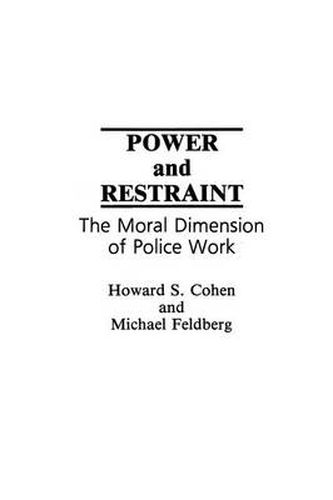Readings Newsletter
Become a Readings Member to make your shopping experience even easier.
Sign in or sign up for free!
You’re not far away from qualifying for FREE standard shipping within Australia
You’ve qualified for FREE standard shipping within Australia
The cart is loading…






In accepting the authority to govern, what responsibilities do the police incur? Power and Restraint attempts to answer this question by using a moral perspective grounded in the social contract, and by defining an ethical basis for police work. Howard S. Cohen and Michael Feldberg posit five standards by which to measure responsible police behaviour; fair access, public trust, safety and security, teamwork, and objectivity. To test their proposals, Cohen and Feldberg apply these standards to several familiar yet challenging cases that are encountered in municipal patrol work in the United States, illustrating how police officers can develop appropriate moral responses to complex and difficult circumstances. These developed standards of ethical behaviour can be used as a basis for the rehearsal of decision-making and action in police training as well as for the judicious evaluation of police behaviour after the fact. The authors developed their theories over a ten-year period by spending hundreds of hours in seminars on police ethics with officers and trainers from across the country, discussing specific cases and examples of moral issues that were most troubling to the officers themselves. Their book should be valuable to instructors in university-level criminal justice courses that deal with ethics or the police. It could also be used in courses in applied ethics in philosophy and will be an important resource for police academy trainers for both in-service and recruit training.
$9.00 standard shipping within Australia
FREE standard shipping within Australia for orders over $100.00
Express & International shipping calculated at checkout
In accepting the authority to govern, what responsibilities do the police incur? Power and Restraint attempts to answer this question by using a moral perspective grounded in the social contract, and by defining an ethical basis for police work. Howard S. Cohen and Michael Feldberg posit five standards by which to measure responsible police behaviour; fair access, public trust, safety and security, teamwork, and objectivity. To test their proposals, Cohen and Feldberg apply these standards to several familiar yet challenging cases that are encountered in municipal patrol work in the United States, illustrating how police officers can develop appropriate moral responses to complex and difficult circumstances. These developed standards of ethical behaviour can be used as a basis for the rehearsal of decision-making and action in police training as well as for the judicious evaluation of police behaviour after the fact. The authors developed their theories over a ten-year period by spending hundreds of hours in seminars on police ethics with officers and trainers from across the country, discussing specific cases and examples of moral issues that were most troubling to the officers themselves. Their book should be valuable to instructors in university-level criminal justice courses that deal with ethics or the police. It could also be used in courses in applied ethics in philosophy and will be an important resource for police academy trainers for both in-service and recruit training.